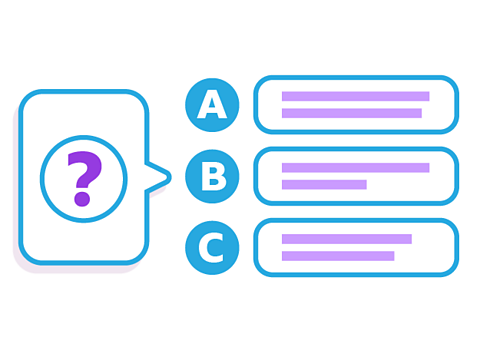Key points about describing yourself and others in French

Use verbA word used to describe an action or state of being. ├к│┘░ї▒Ё and avoir to describe what a person looks like and their personality.
adjectiveAn adjective is a word that describes a noun. In French, adjectives have different endings depending on whether the noun they are describing is masculine, feminine, singular or plural. endings change depending on the genderAll French nouns are either masculine or feminine. In French, objects such as a table or car, as well as people, have a grammatical gender. and number of the nounThe name of a thing such as an object, a place or a person. Nouns are often described as naming words. they are describing.
Some adjectival endings are (irregular) verbAn irregular verb does not follow a set pattern..
This guide contains a video as well as reading and listening practice.
Video - Describing myself and others
Watch the video of Rachel describing herself and her family, as well as talking to other people about themselves.
Rachel and others describe themselves using adjectives and present tense verbs
Salut! Je suis Rachel ! Je suis graphiste et jтАЩhabite ├а Bruxelles en Belgique.
Ma famille me d├йcrirait comme d├йtermin├йe, et je crois que ma copine dirait que j'ai confiance en moi. Je suis dтАЩaccord avec les deux.
J'ai trois fr├иresтАп- Julio, Phillipe et Kevin. Julio est un homme d'affaires et c'est lui qui voyage le plus dans notre famille. Je suis tr├иs jalouse ! Philippe est mon deuxi├иme fr├иre et nous nous ressemblons beaucoup. Et Kevin, cтАЩest le plus jeune, mais le plus fort ! Il peut me porter facilement !
Je parle trois langues couramment: le n├йerlandais, le fran├зais et l'anglais. Mais ma m├иre dit que je parle bien le lingala aussi. C'est une langue du Congo et c'est sa langue maternelle.
Ma m├иre est n├йe au Congo, et elle est venue ici, en Belgique o├╣ elle a rencontr├й mon p├иre, qui est aussi Belge. Ma m├иre est extravertie et positive, mon p├иre est cr├йatif et patient.
Maintenant, que tu sais un peu plus de moi et ma famille, on va d├йcouvrir les gens dans la ville. On y va !
Comment tu t'appelles ?
Je m'appelle Sarah.
Et toi ?
Je m'appelle Kayum.
Tu as quel ├вge ?
J'ai 30 ans.
Et toi ?
Et j'ai aussi 30 ans.
D'o├╣ viens-tu ?
Je viens, a l'origine, du nord de la France, de Lille, mais j'habite ├а Cologne, en Allemagne.
C'est quoi votre relation ?
Nous sommes des copines, juste.
On est des bonnes copines, on ├йtait ensemble ├а l'├йcole secondaire, et maintenant on se voit quand on est ├а l'universit├й, pour prendre des petits caf├йs.
Tu parles quelles langues ?
Je parle le fran├зais, l'anglais, l'allemand, bien s├╗r.
L'italien, un peu d'espagnol, et j'apprends en ce moment le grec.
Waouh, quelle polyglotte !
Et toi, Kayum ?
Et moi, l'anglais, l'espagnol, et le comorien. Parce que je suis originaire des iles Comores.
Waouh ! C'est int├йressant d'apprendre comment les gens se d├йcrivent et comment ils d├йcrivent les autres.
C'est super car il y a beaucoup de gens diff├йrents.
Translation
Hi! IтАЩm Rachel! I am a graphic designer and I live in Brussels, in Belgium.
My family would describe me as determined and I think my girlfriend would say I have confidence in myselfтАж I would agree with both!
I have three brothers - Julio, Phillipe and Kevin. Julio is a businessman and travels more than anyone in the family. I am very jealous! Philippe is my second brother and we look the most alike. And Kevin is the youngest but the strongest! He can pick me up easily!
I speak three languages fluently; Dutch, French and English. But my mum says I can speak Lingala well too. It is a language of Congo and it is her mother tongue.
My mum was born in Congo and she came here, to Belgium, where she met my dad who is also Belgian. My mum is out-going and positive, my dad is creative and patient.
Now you know a bit about me and my family- letтАЩs find out more about people in the city!
WhatтАЩs your name?
IтАЩm called Sarah.
And you?
IтАЩm called Kayum.
How old are you?
IтАЩm 30 years old.
And you?
And IтАЩm also 30 years old.
Where are you from?
IтАЩm, originally, from the north of France, Lille. But I live in Cologne, in Germany.
WhatтАЩs your relationship?
WeтАЩre just friends.
We are good friends, we know each other from secondary school, and now we see each other when weтАЩre at university, to go and drink coffee.
What languages do you speak?
I speak french, english, german, of course.
Italian, a bit of spanish and IтАЩm learning greek at the moment.
Wow, what a polyglot!
Wow! ItтАЩs interesting to learn how people describe themselves and how they describe others.
It's great because there are a lot of different people.
Vocabulary - Describing appearance
Describe physical appearance or personality using adjectives and either:
the verb ├к│┘░ї▒Ё - to be
the verb avoir - to have
To ask what someone looks like or what sort of person they are, say:
Sorry, something went wrongCheck your connection, refresh the page and try again. - Describe yourself
Describing appearance and personality using '├к│┘░ї▒Ё' (to be)
To describe someoneтАЩs physical appearance or their personality, use the relevant part of the verb Sorry, something went wrongCheck your connection, refresh the page and try again. (to be):
| French | English |
|---|---|
| Sorry, something went wrongCheck your connection, refresh the page and try again. | I am |
| Sorry, something went wrongCheck your connection, refresh the page and try again. | you (singular informal) are |
| Sorry, something went wrongCheck your connection, refresh the page and try again. | he/it is |
| Sorry, something went wrongCheck your connection, refresh the page and try again. | she/it is |
| Sorry, something went wrongCheck your connection, refresh the page and try again. | we are |
| Sorry, something went wrongCheck your connection, refresh the page and try again. | you (plural/formal) are |
| Sorry, something went wrongCheck your connection, refresh the page and try again. | they (masculine plural) are |
| Sorry, something went wrongCheck your connection, refresh the page and try again. | they (feminine plural) are |

For example:
Je suis timide. тАУ IтАЩm shy.
Mon fr├иre est emb├кtant. тАУ My brother is annoying.
Mes parents sont strictes. тАУ My parents are strict.
Mon chat est gros. тАУ My cat is fat.

Useful adjectives for describing people using the verb ├к│┘░ї▒Ё include:
| French | English |
|---|---|
| petit(e) | little, short (height) |
| grand(e) | tall, big, large |
| mince | thin, slim |
| gros/grosse | fat |
| beau/bel/belle | beautiful |
| laid(e) | ugly |

For example:
Ma m├иre est tr├иs petite. - My mum is really small.
Sa copine est belle. - Her girlfriend is beautiful.
Je ne suis pas tr├иs grand. - I am not very tall.

Describing hair and eyes using 'avoir' (to have)
To describe someoneтАЩs hair and eyes, use the relevant part of the verb Sorry, something went wrongCheck your connection, refresh the page and try again. (to have):
| French | English |
|---|---|
| Sorry, something went wrongCheck your connection, refresh the page and try again. | I have |
| Sorry, something went wrongCheck your connection, refresh the page and try again. | you (informal) have |
| Sorry, something went wrongCheck your connection, refresh the page and try again. | he/it has |
| Sorry, something went wrongCheck your connection, refresh the page and try again. | she/it has |
| Sorry, something went wrongCheck your connection, refresh the page and try again. | we have |
| Sorry, something went wrongCheck your connection, refresh the page and try again. | you (plural/formal) have |
| Sorry, something went wrongCheck your connection, refresh the page and try again. | they (masculine plural) have |
| Sorry, something went wrongCheck your connection, refresh the page and try again. | they (feminine plural) have |

For example:
┤│тАЩa╛▒ les yeux bleus. тАУ I have blue eyes.
Ma grand-m├иre a les cheveux gris. тАУ My grandma has grey hair.
┤│тАЩa╛▒ un chien noir et blanc. тАУ I have a black and white dog.

Useful vocabulary for describing people using the verb avoir includes:
| French | English | French | English |
|---|---|---|---|
| les cheveux | hair | roux | red (hair) |
| les yeux | eyes | blanc/blanche | white |
| bleu(e) | blue | gris(e) | grey |
| vert(e) | green | blond(e) | blonde |
| marron | brown | court(e) | short (hair) |
| noir(e) | black | long/longue | long |
Using '├к│┘░ї▒Ё' and 'avoir' - Mini quiz

Complete the following sentences with the correct verb.
Je _____ grand.
I am tall.
Je suis grand.
Suis is the тАШIтАЩ form of the verb ├к│┘░ї▒Ё (to be).
Nous _____ paresseux.
We are lazy.
Nous sommes paresseux.
Sommes is the тАШweтАЩ form of the verb ├к│┘░ї▒Ё (to be).
Tu ___ les yeux verts ?
Do you have green eyes?
Tu as les yeux verts ?
As is the you (singular informal) form of the verb avoir (to have).
Elles ___ les cheveux longs.
They have long hair.
Elles ont les cheveux longs.
Ont is the тАШtheyтАЩ form of the verb avoir (to have).
Reading practice
Read the following article and decide if the statements are true or false.

Ma m├иre, Jenny est gentille et s├йrieuse. Malheureusement, elle ne sait pas bien faire la cuisine et ses repas sont rarement d├йlicieux.
Je mтАЩentends bien avec mon p├иre, David. Il est travailleur et ▓╣▓╡░ї├й▓╣▓·▒Є▒Ё, et il aide sa famille dans toutes les situations. Il a un bon sens de l'humour et jтАЩai toujours confiance en lui.
Mon fr├иre, Alex, est amusant et bavard et nous nous ressemblons. Il partage ma passion pour les activit├йs sportives.
Chez nous, on adore les animaux et nous avons un chat, Whiskers, et un chien, Rocky. Whiskers est vieux et paresseux, tandis que Rocky est un chien jeune et fou тАУ il aime jouer tout le temps.
Are the following statements true or false?

- EmmaтАЩs mum is serious.
False
The text says:
Ma m├иre, Jenny, est gentille et s├йrieuse.
My mum, Jenny, is kind and responsible/conscientious.
- EmmaтАЩs mum is not a good cook.
True
The text says:
Malheureusement, elle ne sait pas faire bien la cuisine et ses repas sont rarement d├йlicieux.
Unfortunately, she doesn't know how to cook well and her meals are rarely delicious.
- EmmaтАЩs dad always helps his family.
True
The text says:
тАж il aide sa famille dans toutes les situations тАж
тАж he helps his family in all situations тАж
- Emma and her brother Alex are not similar.
False
The text says:
Nous nous ressemblons. Il partage ma passion pour les activit├йs sportives.
We are similar. He shares my passion for sporting activities.
- EmmaтАЩs cat is old and her dog is crazy.
True
The text says:
Whiskers est vieux et paresseux, tandis que Rocky est un chien jeune et fou.
Whiskers is old and lazy, while Rocky is a young and crazy dog.
Click or tap on the Show more button to read the translation of the text.
My mum Jenny is kind and serious. Unfortunately she cannot cook very well and her meals are rarely delicious.
I get on well with my dad David. He is hard working and nice and he helps his family in all situations. He has a good sense of humour and I always trust him.
My brother Alex is funny and chatty and we look alike. He shares my passion for sporting activities.
At home, we love animals and we have a cat, Whiskers, and a dog, Rocky. Whiskers is old and lazy whereas Rocky is a young and crazy dog - he likes to play all the time.
Useful vocabulary - Describing personality and other characteristics
Adjectives
Here are some useful adjectives to describe yourself and others. Remember to use the verb ├к│┘░ї▒Ё with these adjectives:
| French | English | French | English |
|---|---|---|---|
| ▓╣▓╡░ї├й▓╣▓·▒Є▒Ё | pleasant, nice, agreeable | heureux/heureuse | happy |
| amusant(e) | funny, fun, amusing | jeune | young (m,f) |
| bavard(e) | chatty, talkative | joli(e) | pretty, attractive |
| ╗х░ї├┤▒Є▒Ё | funny | │╛├й│ж│ґ▓╣▓╘│┘(▒Ё) | nasty, mean |
| ▒Ё▓╡┤╟├п▓є│┘▒Ё | selfish | paresseux/paresseuse | lazy |
| ▒Ё│╛▓·├к│┘▓╣▓╘│┘(▒Ё) | annoying | ▓є├й░ї╛▒▒Ё│▄│ц/▓є├й░ї╛▒▒Ё│▄▓є▒Ё | conscientious, responsible |
| ┤┌╛▒▒Ё░ї/┤┌╛▒├и░ї▒Ё | proud | sympathique/sympa | nice, kind, friendly |
| timide | shy, timid | travailleur/travailleuse | hard-working |
Verbs
Useful verbs to describe personality and personal qualities include:
| French | English |
|---|---|
| aider | to help |
| avoir confiance en | to trust |
| avoir le sens de lтАЩhumour | to have a sense of humour |
| chatter/tchatter | to chat |
| comprendre | to understand |
| ├й▓╘▒Ё░ї▒╣▒Ё░ї | to annoy |
| ├к│┘░ї▒Ё ┤┌╛▒▒Ё░ї/┤┌╛▒├и░ї▒Ё de | to be proud of |
| ressembler/se ressembler ├а | to look like + noun/to look alike |
All Foundation Tier vocabulary listed in this guide can be found on the vocabulary sheet below.
Grammar - How to use adjectives
Adjectives describe a noun and all French adjectives agree with the noun in gender and number. Most adjectives come after the noun they describe.
The general rule is:
for feminine nouns, add e
for masculine plural nouns, add s
for feminine plural nouns, add es
| Masculine singular | Feminine singular | Masculine plural | Feminine plural | English |
|---|---|---|---|---|
| Sorry, something went wrongCheck your connection, refresh the page and try again. | Sorry, something went wrongCheck your connection, refresh the page and try again. | Sorry, something went wrongCheck your connection, refresh the page and try again. | Sorry, something went wrongCheck your connection, refresh the page and try again. | intelligent |
| Sorry, something went wrongCheck your connection, refresh the page and try again. | Sorry, something went wrongCheck your connection, refresh the page and try again. | Sorry, something went wrongCheck your connection, refresh the page and try again. | Sorry, something went wrongCheck your connection, refresh the page and try again. | green |

For example:
┤│тАЩa╛▒ les yeux verts. - I have green eyes.
Les chiens sont tr├иs intelligents. тАУ The dogs are very intelligent.

There are different rules for adjectives ending in certain letters.
Click or tap on Show more to find out about forming the different forms of adjectives ending with the following letters:
- x
- el and en
- al
- f
Adjectives ending in x
When an adjective ends in x, remove the x and add se to make it feminine. For example:
Mon chat est heureux. - My cat is happy.
Ma s┼Уur est toujours heureuse. тАУ My sister is always happy.
For masculine plural nouns, keep the x. For example:
Mon fr├иre est paresseux. тАУ My brother is lazy.
Mes copains sont paresseux. тАУ My friends are lazy.
For feminine plural nouns, remove the x and add ses. For example:
Ma s┼Уur est paresseuse. тАУ My sister is lazy.
Mes copines sont paresseuses. тАУ My (female) friends are lazy.
Adjectives ending in el and en
When an adjective ends in el, add le to make it feminine. If the adjective ends in en, add ne to make it feminine.
Add s to make the masculine adjectives plural and les or nes to make the feminine adjectives plural.
| Masculine singular | Feminine singular | Masculine plural | Feminine plural | English |
|---|---|---|---|---|
| Sorry, something went wrongCheck your connection, refresh the page and try again. | Sorry, something went wrongCheck your connection, refresh the page and try again. | Sorry, something went wrongCheck your connection, refresh the page and try again. | Sorry, something went wrongCheck your connection, refresh the page and try again. | traditional |
| Sorry, something went wrongCheck your connection, refresh the page and try again. | Sorry, something went wrongCheck your connection, refresh the page and try again. | canadiens | Sorry, something went wrongCheck your connection, refresh the page and try again. | Canadian |
For example:
Ma s┼Уur est gentille. тАУ My sister is kind.
Mes copains sont v├йg├йtariens. тАУ My friends are vegetarian.
Adjectives ending in al
When an adjective ends in al, add an e to make it feminine and es to make it feminine plural.
To make it masculine plural, change the al to aux. For example:
Mon petit copain est g├йnial. тАУ My boyfriend is great.
Mes parents sont g├йniaux. тАУ My parents are great.
Adjectives ending in f
When an adjective ends in f, remove the f and add ve to make it feminine. For example:
Mon fr├иre est tr├иs actif. тАУ My brother is very active.
Ma m├иre est tr├иs active. тАУ My mum is very active.
To make the adjectives plural, add s with masculine nouns and ves for feminine nouns. For example:
Mes fr├иres sont tr├иs actifs. тАУ My brothers are very active.
Mes s┼Уurs sont tr├иs actives. тАУ My sisters are very active.
Irregular adjectives
Some adjectives are completely irregular, meaning they do not follow the rules when agreeing with feminine and plural nouns.
Useful irregular adjectives include:
| Masculine singular | Feminine singular | Masculine plural | Feminine plural | English |
|---|---|---|---|---|
| Sorry, something went wrongCheck your connection, refresh the page and try again. | Sorry, something went wrongCheck your connection, refresh the page and try again. | Sorry, something went wrongCheck your connection, refresh the page and try again. | Sorry, something went wrongCheck your connection, refresh the page and try again. | beautiful, handsome, nice (weather) |
| Sorry, something went wrongCheck your connection, refresh the page and try again. | Sorry, something went wrongCheck your connection, refresh the page and try again. | Sorry, something went wrongCheck your connection, refresh the page and try again. | Sorry, something went wrongCheck your connection, refresh the page and try again. | big, large, lots of |
| Sorry, something went wrongCheck your connection, refresh the page and try again. | Sorry, something went wrongCheck your connection, refresh the page and try again. | Sorry, something went wrongCheck your connection, refresh the page and try again. | Sorry, something went wrongCheck your connection, refresh the page and try again. | crazy |
| Sorry, something went wrongCheck your connection, refresh the page and try again. | Sorry, something went wrongCheck your connection, refresh the page and try again. | Sorry, something went wrongCheck your connection, refresh the page and try again. | Sorry, something went wrongCheck your connection, refresh the page and try again. | good |
| Sorry, something went wrongCheck your connection, refresh the page and try again. | Sorry, something went wrongCheck your connection, refresh the page and try again. | Sorry, something went wrongCheck your connection, refresh the page and try again. | Sorry, something went wrongCheck your connection, refresh the page and try again. | hardworking |
| Sorry, something went wrongCheck your connection, refresh the page and try again. | Sorry, something went wrongCheck your connection, refresh the page and try again. | Sorry, something went wrongCheck your connection, refresh the page and try again. | Sorry, something went wrongCheck your connection, refresh the page and try again. | long |
| Sorry, something went wrongCheck your connection, refresh the page and try again. | Sorry, something went wrongCheck your connection, refresh the page and try again. | Sorry, something went wrongCheck your connection, refresh the page and try again. | Sorry, something went wrongCheck your connection, refresh the page and try again. | new |
| Sorry, something went wrongCheck your connection, refresh the page and try again. | Sorry, something went wrongCheck your connection, refresh the page and try again. | Sorry, something went wrongCheck your connection, refresh the page and try again. | Sorry, something went wrongCheck your connection, refresh the page and try again. | old |
| Sorry, something went wrongCheck your connection, refresh the page and try again. | Sorry, something went wrongCheck your connection, refresh the page and try again. | Sorry, something went wrongCheck your connection, refresh the page and try again. | Sorry, something went wrongCheck your connection, refresh the page and try again. | white |
| Sorry, something went wrongCheck your connection, refresh the page and try again. | Sorry, something went wrongCheck your connection, refresh the page and try again. | Sorry, something went wrongCheck your connection, refresh the page and try again. | Sorry, something went wrongCheck your connection, refresh the page and try again. | kind |
Using adjectives - Mini quiz

Choose the correct adjective in each of the following sentences:
Mes cheveux sont [blond/blonds/blondes].
Mes cheveux sont blonds.
My hair is blond.
Cheveux (hair) is masculine and plural, so the adjective ends in s.
Ma s┼Уur est [▓є├й░ї╛▒▒Ё│▄│ц/▓є├й░ї╛▒▒Ё│▄▓є▒Ё/s├йrieuses].
Ma s┼Уur est s├йrieuse.
My sister is responsible.
│з▓╒│▄░ї (sister) is feminine, and as this is an adjective ending in x, the feminine singular form ends in se.
Ma m├иre est travailleur/travailleuse/travailleuses.
Ma m├иre est travailleuse.
My mum is hard-working.
▓╤├и░ї▒Ё (mum) is feminine singular, and this irregular adjective therefore ends in euse.
Mon ami Lucas est tr├иs beau/belle/beaux.
Mon ami Lucas est tr├иs beau.
My friend Lucas is very handsome.
Ami (male friend) is masculine singular, and this irregular adjective is beau.
Find out more about adjectival agreements in the Position of adjectives in French guide.
Listening practice
Listen to three people talking about what makes a good friend and answer the questions.
Click or tap on the purple START button when you are ready to begin the activity.
Video - Describing people in French
Watch the video to understand more about using ├к│┘░ї▒Ё and avoir when describing yourself and others.
Use the verbs '├к│┘░ї▒Ё' and 'avoir' to describe yourself and others
Describing people in French
When youтАЩre describing how you or other people look or are - then ├к│┘░ї▒Ё - the тАОverb to be is a good place to start.тАО
Je suis - I am or elle est - she is.тАО
Je suis grand - I am tall.тАО
Elle est petite - She is small.тАО
Je suis sportif - I am sporty. тАО
тАОElle est contente - She is happy.тАО
Then itтАЩs good to be able to say what people have using the verb avoir - to тАОhave.
┤│тАЩa╛▒ - I have
Elle a - she has.
┤│тАЩa╛▒ les cheveux longs - I have long hairтАО.
Elle a les yeux bruns - She has brown eyes. тАО
Then you can say what you wear using porter - to wearтАО.
тАОje porte - I wear.
elle porte - she wears.
Je porte des lunettes - I wear glasses.
Elle porte un foulard - She wears a headscarf.тАО
So with ├к│┘░ї▒Ё - to be, avoir - to have or porter - to wear you can say a lot about тАОyourself or other people.тАО
Vocabulary sheet
Click or tap on the image below for a list of useful vocabulary to use when describing yourself or others.

Higher Tier - Vocabulary - Describing personality
Useful Higher Tier adjectives include:
| French | English |
|---|---|
| patient(e) | patient |
| sensible | sensitive |
| vif/vive | lively |
Useful Higher Tier verbs include:
| French | English |
|---|---|
| critiquer | to criticise |
| d├йpendre de | to depend on |
| sembler | to seem |
All vocabulary listed in this guide can be found on the vocabulary sheet below.
Higher Tier - Vocabulary sheet
Click or tap on the image below for a list of useful Higher Tier vocabulary to use when describing yourself or others.

Now you have revised the important vocabulary and key grammar points for describing yourself and others, why not have a look at Describing life at school in French?
More on Identity and relationships with others
Find out more by working through a topic
- count3 of 3

- count1 of 3
